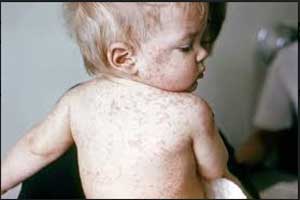- Home
- Editorial
- News
- Practice Guidelines
- Anesthesiology Guidelines
- Cancer Guidelines
- Cardiac Sciences Guidelines
- Critical Care Guidelines
- Dentistry Guidelines
- Dermatology Guidelines
- Diabetes and Endo Guidelines
- Diagnostics Guidelines
- ENT Guidelines
- Featured Practice Guidelines
- Gastroenterology Guidelines
- Geriatrics Guidelines
- Medicine Guidelines
- Nephrology Guidelines
- Neurosciences Guidelines
- Obs and Gynae Guidelines
- Ophthalmology Guidelines
- Orthopaedics Guidelines
- Paediatrics Guidelines
- Psychiatry Guidelines
- Pulmonology Guidelines
- Radiology Guidelines
- Surgery Guidelines
- Urology Guidelines
Vaccine protects against serious complication of Measles

Usual acute complications of measles include otitis media, pneumonia, diarrhoea, and postinfectious encephalitis. But in literature, several cases of Subacute Sclerosing Panencephalitis have been reported following measles infection. It is a rare, progressive, and fatal central nervous system disorder resulting from persistent measles virus infection.
Subacute Sclerosing Panencephalitis or SSPE is a gradually progressive degenerative disease of the brain caused by infection with measles virus.
SSPE is a neurodegenerative disease caused by persistent infection of the brain by an altered form of the measles virus. Neither the biology underlying the viral persistence nor the triggering mechanism for viral reactivation is well understood. The incidence of SSPE is approximately 4–11 cases per 100,000 cases of measles, although when measles infection is acquired before 1 year of age, the risk is higher (18 per 100,000 cases).
SSPE occurs after 2-10 years in children and young adults who seem to have recovered from the initial infection. Boys are affected more than girls. In most cases, infected children remain symptom-free for 6-15 years after acute measles infection.
The initial symptoms of SSPE usually involve regressive changes in intellect and personality. Within several months, the psychological symptoms are compounded by neurologic ones, most often consisting of myoclonic jerks.
The tests for diagnosis are EEG (electroencephalogram) which detects the electrical activity of the brain and spinal fluid examination. The diagnosis is significant because there are increasing reports from some parts of India where families are refusing measles vaccines.
Death finally occurs due to pneumonia in most cases. Seizures and loss of vision have also been reported in many cases.
An abnormal immune response to measles or, possibly, certain mutant forms of the virus may cause progressive brain damage leading to brain inflammation (swelling and irritation) and death. Measles vaccination protects from SSPE and it does not alter or trigger SSPE if someone has already been infected.
There is no cure for SSPE. Treatment with immune modulator drugs like interferon alpha may cause remission in some cases for 1-3 years. Measles infection and subsequent development of SSPE is preventable with measles vaccination in early childhood.

Disclaimer: This site is primarily intended for healthcare professionals. Any content/information on this website does not replace the advice of medical and/or health professionals and should not be construed as medical/diagnostic advice/endorsement or prescription. Use of this site is subject to our terms of use, privacy policy, advertisement policy. © 2020 Minerva Medical Treatment Pvt Ltd